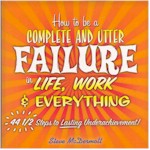 |
|
|
| ||||||
|
|
This page is the original source of this review, though you may also find it on Amazon or other sites. | ||
| Book Reviews Home | Free Audio Books | |
 |
Book Review of: How to be a Complete and Utter Failure in Life, Work, & Everything44 1/2 Steps to Lasting Underachievement Price:
$11.99 Availability: Usually ships
within 24 hours
|
| Review
of
How to be a Complete and Utter Failure in Life, Work, & Everything,
by Steve McDermott (Paperback, 2008) (You can print this review in landscape mode, if you want a hardcopy) Reviewer: Mark Lamendola, author of over 6,000 articles. What a delightful book. McDermott has wit on par with Monty Python and insight on par with Tom Rogers. Using reverse logic, McDermott provides a treasure trove of solid advice under the guise of comically telling you how to fail. This makes the reader think about the actual point being made, and that process aids in remembering. McDermott also helps the reader's memory by including pithy quotations. The book weighs in at 196 pages, and consists of 44 short chapters (chapter 44 is labeled 44 1/2). Each chapter addresses a specific step to take if you want to ensure you are a complete and utter failure. These include such things as:
These are precisely the things that differentiate successful people from those who merely glide along (or worse). By assuming the position of wanting to be a failure, McDermott has some fun while also bringing up issues all of us should take seriously. Each chapter starts with a relevant quote, such as this one from Chapter Five: "Never let your memories be greater than your dreams." (Doug Ivestor). In keeping with the "how to fail" theme, these are designated "Quote to Avoid." McDermott talks about how you can avoid whatever it is that chapter advises you against. In doing this, he addresses the excuses people use for not doing those things (as if these are the correct reasons), resources to avoid, steps not to take, habits not to form, and so forth. He sums up each chapter with a box called "Action not to take." Of course, if you do the opposite of all this you will be a success rather than a failure. The text also contains instructive anecdotes from people who have succeeded (McDermott cautions you not to do whatever it is they did) and those who have failed (follow their pattern and do what they did, McDermott advises).
Like many self-help or self-improvement books, this one is light reading. But that's not because it lacks substance. It's because the author uses plain language and writes clearly, and the book is not quite a couple hundred pages. If you're into reading these kinds of books, this is a good one to add to your collection. You may want to read one chapter a day for 44 days. The effort McDermott put forth to serve the reader is evident. This isn't a fluff piece for selling on McDermott's rubber chicken circuit. The book stands on its own as easily worth its price. And there's something more that puts this book in rare company. McDermott is a speaker and author in the U.K., so he doesn't have the bad American author habit of lacing a "nonfiction" book with unrelated personal political views. Missing also is the now common presentation of disinformation as fact. At one time, the absence of these things was unremarkable and expected. Today, the absence is both remarkable and pleasantly surprising. This is the kind of writing that helps build a book-reading population, something that has unfortunately been on the decline for years. | |
About these reviewsYou may be wondering why the reviews here are any different from the hundreds of "reviews" posted online. Notice the quotation marks? I've been reviewing books for sites like Amazon for many years now, and it dismays me that Amazon found it necessary to post a minimum word count for reviews. It further dismays me that it's only 20 words. If that's all you have to say about a book, why bother? And why waste everyone else's time with such drivel? As a reader of such reviews, I feel like I am being told that I do not matter. The flippancy of people who write these terse "reviews" is insulting to the authors also, I would suspect. This sound bite blathering taking the place of any actual communication is increasingly a problem in our mindless, blog-posting Webosphere. Sadly, Google rewards such pointlessness as "content" so we just get more if this inanity. My reviews, contrary to current (non) standards, actually tell you about the book. I always got an "A" on a book review I did as a kid (that's how I remember it anyhow, and it's my story so I'm sticking to it). A book review contains certain elements and has a logical structure. It informs the reader about the book. A book review may also tell the reader whether the reviewer liked it, but revealing a reviewer's personal taste is not necessary for an informative book review. About your reviewer
About reading styleNo, I do not "speed read" through these. That said, I do read at a fast rate. But, in contrast to speed reading, I read everything when I read a book for review. Speed reading is a specialized type of reading that requires skipping text as you go. Using this technique, I've been able to consistently "max out" a speed reading machine at 2080 words per minute with 80% comprehension. This method is great if you are out to show how fast you can read. But I didn't use it in graduate school and I don't use it now. I think it takes the joy out of reading, and that pleasure is a big part of why I read. |
| |||||